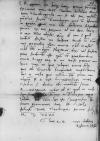Reverendissimo principi ac domino, domino ⌊Ioanni Dantisco⌋ episcopo Culmensi, oratori regio etc., domino ac patrono summo suo
Rogavit me harum lator, optime Princeps, eximius vir dominus doctor ⌊Sebaldus Monsterus Noribergensis⌋, ut se tibi per epistulam quantumvis brevem commendarem, quod cum libenter in gratiam tanti viri essem facturus, suspicabar primum ex tuis proximis ad me datis litteris te iam omnino abiisse eamque ob rem, si quid scriberem, frustra me scribere. Deinde cum omnino mos gerendus esset amico nihil iniustum nihil etiam indignum flagitanti, duxi vel frustra potius scribendum esse quam non gratificandum amico. Rogo itaque te, mi carissime patrone, ut hunc virum ea qua reliquos omnes soles quos tibi commendo benignitate complectaris; hoc in verbo quia insunt omnia, plura non adiiciam, et tu nosti Laconismos meos. Velim, si diutius tibi manendum sciero ⌊Ratisponae⌋, redire ad te, quod ut mihi significes [patrone] summe, te summopere rogo. Saluta omnes nostros, hoc est ⌊Campensem⌋ et fratres germanos tuos et vale felicissime.

